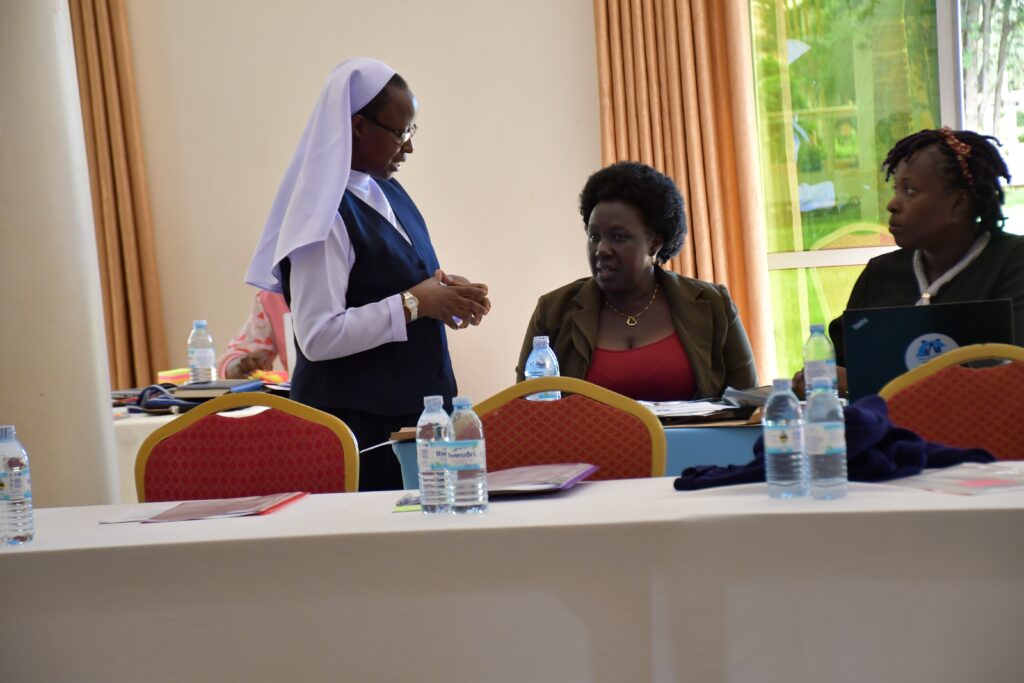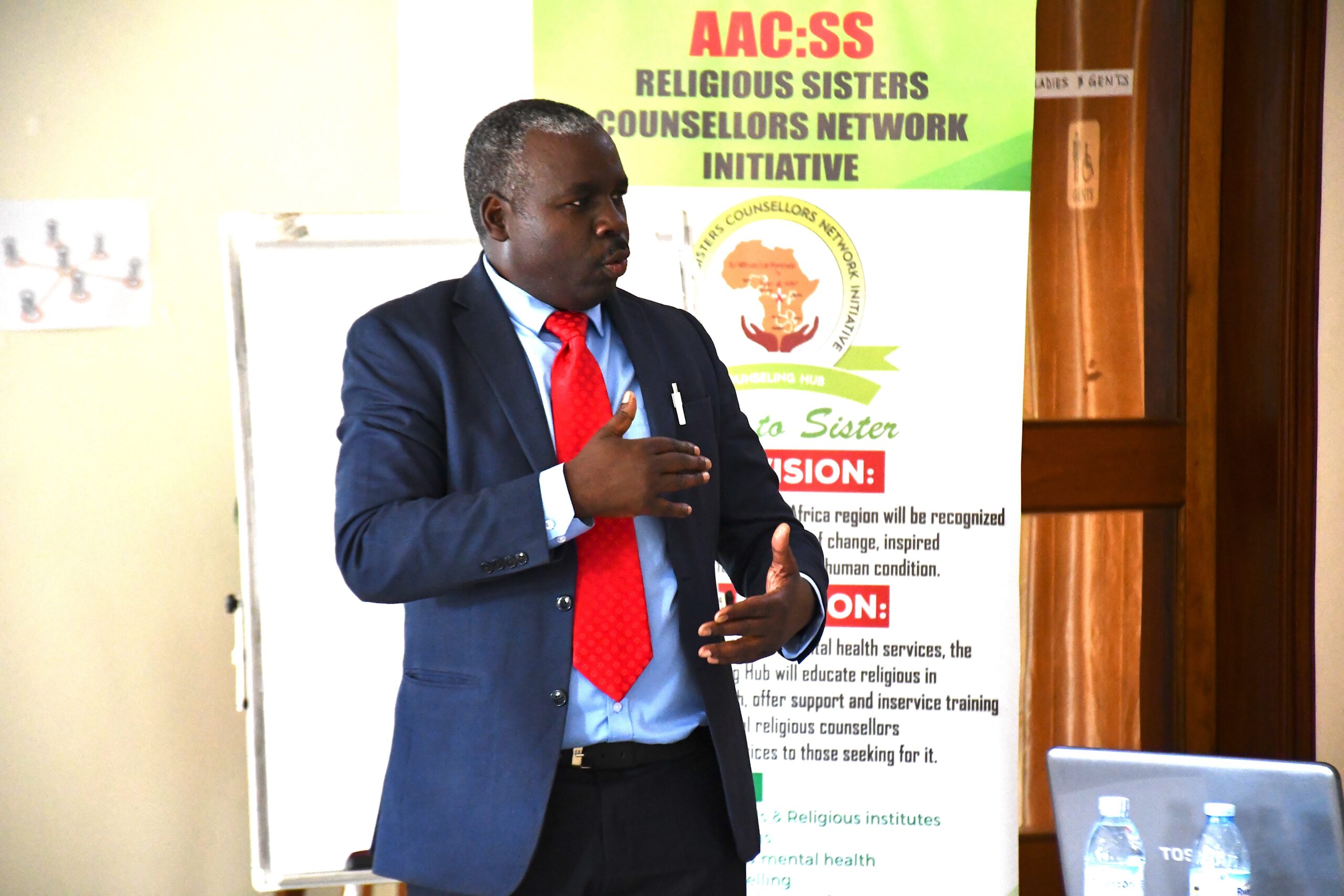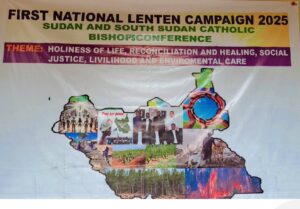UGANDA: ARU President Challenges Sister Counsellors to Make Counselling a Normal Health Service

Sr. Grace Candiru, MSMMC
The President of the Association of Religious in Uganda, (ARU), Sr. Speranza Namusisi has challenged Sister counsellors to help people understand that counselling is normal just as seeing a medical doctor.
“It is you (the counsellors) who are going to help us to love being counselled and not think those who seek the services have a mental problem,” she said. “It is an area which is almost neglected, and the biggest challenge is when none of us is positive about it,” she went on.
Sr. Namusisi who is also Superior General of the Immaculate Heart of Mary Reparatrix Sisters was speaking at the opening of the first in-person meeting of the All-Africa Conference Sister to Sister-Religious Sisters Counsellors Network Initiative in Bugonga in Entebbe, Uganda. The three-day conference, which drew Sister counsellors from Malawi, Zambia and Uganda was also attended by members from the national counselling associations from these countries.
She urged the Sisters to work together, strengthen the bonds that exist among them, and in the process strengthen their conferences.
“The Counselling Hub is at its initial stage but if you work together, neighbours will be touched,” adding that our conferences cannot be strong if we are not connected.
All Africa Conference Sister to Sister, (AAC:SS) is the relationship of global Religious and lay people with Sub-Saharan African Women Religious (Catholic Sisters) in six countries of Cameroon, Malawi, Nigeria, Uganda, Zambia, and Zimbabwe.
Two Religious Sisters – Sr. Margaret Farley and Eileen Hogan, both Sisters of Mercy (RSM) in the USA – are credited with the foundation of AAC:SS in 2002 as a resource to help women Religious in Africa. With its first conference held in 2003 in Nairobi, Kenya, the model equips Religious Sisters to learn, collaborate, train and support one another on a wide range of issues.
AAC:SS Senior Programme’s officer for Africa, Sr. Eneless Chimbali who addressed the participants, traced the origin of the Religious Sisters Counsellors Network Initiative to 2007 when AAC:SS partnered with Uganda Martyrs University to develop a certificate and degree programmes in mental health counselling for women religious in sub-Saharan Africa.
A GHR Foundation funded program resulted into over 165 Sisters benefiting, with 17 of them graduating at Masters level. Slightly over a year ago, a grant from the Conrad N Hilton Foundation enabled AAC:SS to set up a professional network of trained counsellors. The network provides ongoing training and resources and encourages collaboration among sister counsellors from Uganda Cameroon, Malawi, Zambia and Zimbabwe.
Sr Eneless who hails from Malawi further explained that Sister to Sister (AAC:SS) is working with the Association of the Religious in Uganda, (ARU) to strengthen access to counselling services. She said the Counselling Hub is aimed at providing ongoing training and resources and encouraging collaboration among counsellor sisters from the five countries.
“The Hub will serve as a training site for sisters who can in turn create additional satellite hubs in Uganda and other African countries,” she said of one of the key objectives. She outlined other objectives as staffing of the counselling hub, creation of a network of over 120 to 150 trained counsellors and professional development of the members.
With its vision to be recognised as compassionate agents of change, Sr. Chimbali said the Counselling Hub will enhance religious women’s understanding of mental health, offer support and in service training for professional religious counsellors as well as provide counselling services for those seeking care, as part of its wider mission.
However, until recently, Sister counsellors from the three countries (Malawi, Zambia and Uganda) had each worked individually in apostolates where their superiors assigned them. In Uganda, Sister Counsellors in the north especially responded to the needs of the people who were affected by the over 20 years of insurgence in the country. In Malawi, it was cyclone Freddy that brought the four sisters who are trained in counselling to work together as a team for the first time.
Now Sister counsellors from these countries have formed their own networks with leadership teams in place and are being encouraged to collaborate with the national counselling associations of their various countries. They have also formed partnerships with other organisations, among them antihuman trafficking network while at the same time bringing counselling services closer to the people and continued ongoing sensitisation on counselling.
The Counselling Hub in Uganda
 Since the setup of the Counselling Hub, the management of the Hub has fully launched a sensitisation campaign on counselling with a focus on Religious institutes, besides putting in place operational and administrative guidelines. Although many religious institutes of women in Uganda have trained counsellors, not much has been done in the area as far as counselling services to members is concerned.
Since the setup of the Counselling Hub, the management of the Hub has fully launched a sensitisation campaign on counselling with a focus on Religious institutes, besides putting in place operational and administrative guidelines. Although many religious institutes of women in Uganda have trained counsellors, not much has been done in the area as far as counselling services to members is concerned.
Sr. Goretti, the assistant program manager at the Counselling Hub explained that they had picked on the topic of stress, which she said most people are not aware of, and that this is currently being done through group sessions. She said the Centre plans to take on more sessions especially at congregational level.
“From our experience so far, we have realized there is need for counselling services, especially at congregational level and some individuals are reaching out to us on this,” she said. She said they have already carried out group sensitisation on mental health in one of the institutes, after which they talked to individual members, some of whom made appointments for similar sessions.
She was, however, quick to note that there was need to concretise the activities of the Counselling Hub as more people today are faced with issues at their places of work and that many of these are in need of counselling services.
The Immaculate Heart of Mary Reparatrix Sister noted that their team also had the opportunity to meet the novices and junior sisters during their joint annual national courses for their groups and from their experience, it was clear that there was need for counselling services. She however observed that some novices and junior sisters seemed afraid at the beginning of the sessions, thinking they were being spied on. They eventually relaxed, as the session progressed, and some of them started seeking for individual counselling services. “Our counsellors slept past 1:00am in the morning,” she said.
Challenges
Sr. Goretti identified lack of proper understanding of what counselling is all about and its acceptance, as a deterrent factor in their activities.
“It is strong people who seek counselling because they have the awareness and acceptance that they have a problem and so are able to seek for a solution,” she observed.
Another key challenge facing the counselling network is the cost of the service. While they currently charge UGX 50,000, (equivalent of US$13) per session, this cost is not affordable to many people, as one has to do more than one session, plus of course other costs like transport etc.
Coupled with the above challenges, the nun observed that there was still need to sensitise Major Superiors as well as at all levels to understand that counselling is normal and that the stigma surrounding it are unnecessary.
Earlier on, the Project Coordinator for Religious Sisters Counsellors Network Initiative, Sr. Editrudis Kajuna in her welcome remarks challenged the participants to fully participate in realising the vision and mission of the Initiative.
“I welcome you counsellors to come and learn, practice and experience so as to respond to the emerging needs of religious institutes and families in the area of counselling,” she said. She was however quick to note that counselling services are paid for, and that this must be made clear to prospective clients from the very beginning.
Highlighting some of the activities of the Hub, she said the Initiative would foster professional development of counsellors through ongoing professional workshops for members, as a key component.
“The workshops are aimed at empowering members to server better – to create unity and collaboration,” adding that there was need for counsellors to work on themselves and observe ethical principles of the profession.
The Tanzanian nun further underscored the need for confidentiality saying it was the backbone of the profession.
“With all that is shared with you, the need for confidentiality cannot be overemphasised,” saying the counsellors needed to work on themselves so that others can build confidence in them. “Have passion for your profession and serve with a difference,” she added.
Sr. Kajuna, a member of Our Lady of Good Counsel further called for collaboration among the counsellors saying people are experts in one aspect of counselling or the other (stigma, trauma, family, child counselling, etc), and therefore should make referrals when the need arises.
“Listen to your sister who may need counselling and where possible refer them in case they require counselling in the area you are not conversant with or from another person other than you,” she said.
Later on, participants were guided to a general discussion on the topic of counselling. These discussions provided a roadmap for what is needed and participants were tasked to come up with activity plans for their countries.
Besides country specific programs, participants also came up with programmes that could be done across the three countries and these included psychological assessment, family and addiction, among others.


